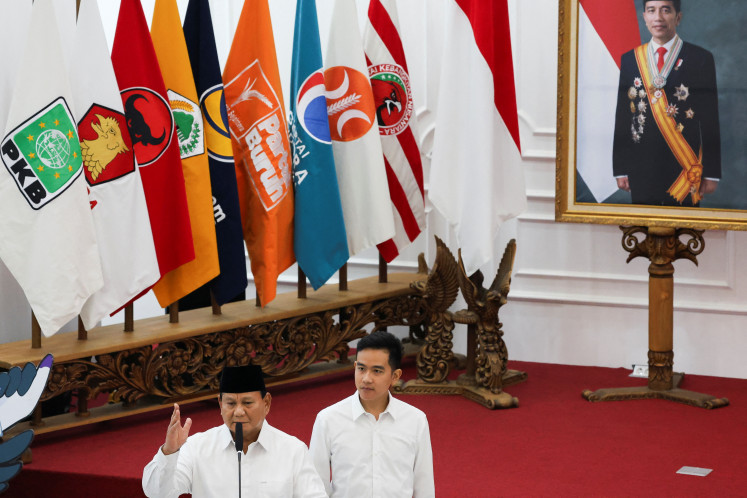Editorial: Lawmakers vs politicians
As in the past, the House of Representatives marked the first day of its first legislative session in 2012 with a high-sounding pledge on Monday
Change Size

A
s in the past, the House of Representatives marked the first day of its first legislative session in 2012 with a high-sounding pledge on Monday.
House Speaker Marzuki Alie told a plenary session at the House that the law-making body would dedicate its time and energy to completing deliberation of 64 priority bills this year.
Looking at the House’s past performance — specifically in 2011, when lawmakers approved less than half of the 70 “priority” bills on its legislative agenda — lawmakers haven’t given us much assurance that they will live up to their promises this time around.
And then there’s the fact that all of the political parties in the House are eager for a head-start in the legislative and presidential elections in 2014.
One may quickly cast doubt on whether Marzuki’s New Year resolution will be fulfilled. The hall where the plenary gathering was held on Monday was half empty, in stark contrast with the speaker’s commitment to advance the House’s performance.
Technical competence is perhaps the thing that lawmakers are still lacking in deliberating bills, resulting in protracted debates with the government, as in the case of the Law on Social Security Providers and the Law on the Financial Services Authority (OJK), both of which were endorsed by the House only after several legislative sessions.
The ability of lawmakers to make laws has long been a cause for concern, despite expert staff members hired to advise House members on the contentious issues within a bill or on which public causes to pursue.
Newly passed bills have often met with public resistance and brought to the Constitutional Court for judicial review, merely because some deemed that the laws caused legal uncertainty or discriminated against certain groups.
The vulnerability of laws to judicial review motions — and a high possibility that the Constitutional Court will rule in favor of plaintiffs — speaks volumes on lawmakers’ ability — or inability — to legislate.
Judicial reviews are allowed in a democracy to ensure that the rule of law is upheld, but on the other hand the sheer number of reviews filed indicates the amount of wasted time, energy and stemming from lawmakers’ incompetence.
Among the crucial bills that might likely be contested if they are endorsed include the election bill and the national security bill. Lawmakers are also at odds over revising the electoral threshold, which ranges between 2.5 and 5 percent.
The national security bill is no less contentious as it will diminish the National Police’s monopolization of public security and safety in favor of a National Security Council. The bill will also reinstate the role of the Indonesian Military (TNI) in security affairs, though the TNI will not be as central as it was during the New Order regime.
The toughest test of the “legislation year” looks to come from the House members, who have so far acted more as politicians than lawmakers. State policies produced by the House are mostly a result of transactions, either for a share of power or money. The latest investigations into bribery allegations involving House members are more than enough to confirm the existence of transactional politics.
With political turmoil over controversial issues such as the Bank Century bailout unlikely to abate, hopes for politicians to dedicate themselves to legislation look remote.









